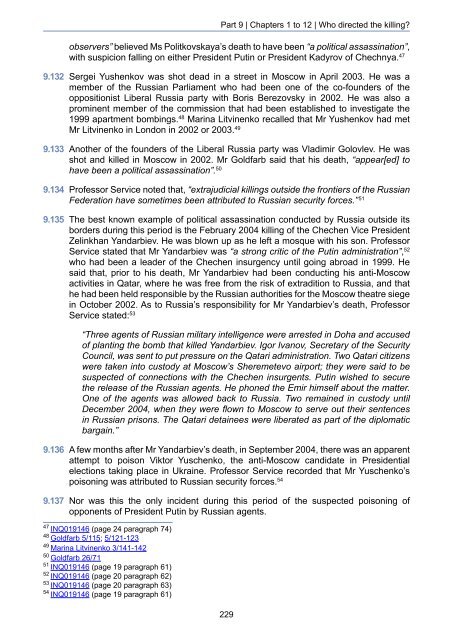The Litvinenko Inquiry
JIEp7Zyr
JIEp7Zyr
You also want an ePaper? Increase the reach of your titles
YUMPU automatically turns print PDFs into web optimized ePapers that Google loves.
Part 9 | Chapters 1 to 12 | Who directed the killing?<br />
observers” believed Ms Politkovskaya’s death to have been “a political assassination”,<br />
with suspicion falling on either President Putin or President Kadyrov of Chechnya. 47<br />
9.132 Sergei Yushenkov was shot dead in a street in Moscow in April 2003. He was a<br />
member of the Russian Parliament who had been one of the co-founders of the<br />
oppositionist Liberal Russia party with Boris Berezovsky in 2002. He was also a<br />
prominent member of the commission that had been established to investigate the<br />
1999 apartment bombings. 48 Marina <strong>Litvinenko</strong> recalled that Mr Yushenkov had met<br />
Mr <strong>Litvinenko</strong> in London in 2002 or 2003. 49<br />
9.133 Another of the founders of the Liberal Russia party was Vladimir Golovlev. He was<br />
shot and killed in Moscow in 2002. Mr Goldfarb said that his death, “appear[ed] to<br />
have been a political assassination”. 50<br />
9.134 Professor Service noted that, “extrajudicial killings outside the frontiers of the Russian<br />
Federation have sometimes been attributed to Russian security forces.” 51<br />
9.135 <strong>The</strong> best known example of political assassination conducted by Russia outside its<br />
borders during this period is the February 2004 killing of the Chechen Vice President<br />
Zelinkhan Yandarbiev. He was blown up as he left a mosque with his son. Professor<br />
Service stated that Mr Yandarbiev was “a strong critic of the Putin administration”, 52<br />
who had been a leader of the Chechen insurgency until going abroad in 1999. He<br />
said that, prior to his death, Mr Yandarbiev had been conducting his anti-Moscow<br />
activities in Qatar, where he was free from the risk of extradition to Russia, and that<br />
he had been held responsible by the Russian authorities for the Moscow theatre siege<br />
in October 2002. As to Russia’s responsibility for Mr Yandarbiev’s death, Professor<br />
Service stated: 53<br />
“Three agents of Russian military intelligence were arrested in Doha and accused<br />
of planting the bomb that killed Yandarbiev. Igor Ivanov, Secretary of the Security<br />
Council, was sent to put pressure on the Qatari administration. Two Qatari citizens<br />
were taken into custody at Moscow’s Sheremetevo airport; they were said to be<br />
suspected of connections with the Chechen insurgents. Putin wished to secure<br />
the release of the Russian agents. He phoned the Emir himself about the matter.<br />
One of the agents was allowed back to Russia. Two remained in custody until<br />
December 2004, when they were flown to Moscow to serve out their sentences<br />
in Russian prisons. <strong>The</strong> Qatari detainees were liberated as part of the diplomatic<br />
bargain.”<br />
9.136 A few months after Mr Yandarbiev’s death, in September 2004, there was an apparent<br />
attempt to poison Viktor Yuschenko, the anti-Moscow candidate in Presidential<br />
elections taking place in Ukraine. Professor Service recorded that Mr Yuschenko’s<br />
poisoning was attributed to Russian security forces. 54<br />
9.137 Nor was this the only incident during this period of the suspected poisoning of<br />
opponents of President Putin by Russian agents.<br />
47<br />
INQ019146 (page 24 paragraph 74)<br />
48<br />
Goldfarb 5/115; 5/121-123<br />
49<br />
Marina <strong>Litvinenko</strong> 3/141-142<br />
50<br />
Goldfarb 26/71<br />
51<br />
INQ019146 (page 19 paragraph 61)<br />
52<br />
INQ019146 (page 20 paragraph 62)<br />
53<br />
INQ019146 (page 20 paragraph 63)<br />
54<br />
INQ019146 (page 19 paragraph 61)<br />
229


